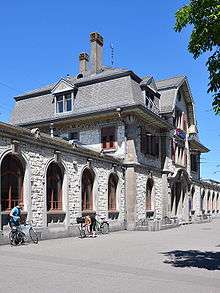Oerlikon (Zürich)
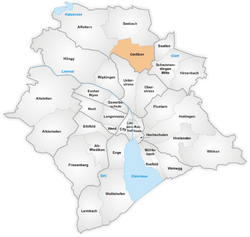

Oerlikon is a quarter in the northern part of Zürich, Switzerland.
A formerly independent municipality, Oerlikon was merged with Zürich in 1934 and forms today, together with Affoltern and Seebach, the city district 11.
History
The name Oerlikon goes back to the alemannic settlement founder Orilo. Oerlikon was mentioned for the first time in the year 946 (other source: 942) as Orlinchowa. At that time the town consisted of no more than one dozen houses and was part of the municipality Schwamendingen, where the inhabitants of Oerlikon went to school and attended church. In 1855 a railway that connected southern Germany with Zürich was built. Thus, Oerlikon grew at a very fast pace and became a hub for industry and trade. In 1872 Oerlikon was separated from Schwamendingen and became its own municipality. In 1897 a tramway from Zürich to Oerlikon was built. Branch lines led also to Seebach and Schwamendingen.
Places of interest
South of the railway line the Oerlikon town center with the shopping centres Neumarkt and züri 11 shopping, the luxurious hotel Swissôtel and the market place are located. North of the station, a new quarter called Neu-Oerlikon (New Oerlikon) is being built. In the former industrial area new living and working area is created. This urban architecture is lightened up by generous parks. In the last few years, four very outstanding new parks were built: The Oerliker Park with a look-out tower, the MFO-Park on the area of the earlier engine factory Maschinenfabrik Oerlikon, the Traugott Wahlen-Park and the Louis-Häfliger-Park.
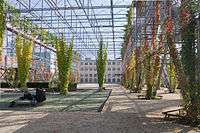 MFO-Park
MFO-Park- Oerliker-Park
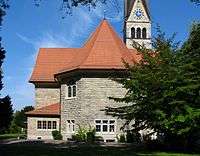 Reformed church
Reformed church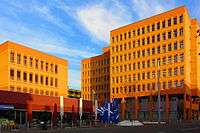 Dorflinde, district administration buildings at Schwamendingenstrasse
Dorflinde, district administration buildings at Schwamendingenstrasse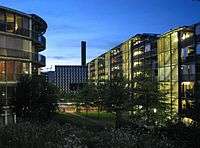 Sunset in Zürich Nord (Regina-Kägi-Hof)
Sunset in Zürich Nord (Regina-Kägi-Hof)- Oerlikon and Zürich-Nord as seen from Seebach
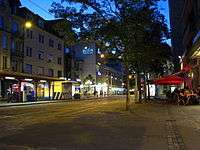 Tram station Sternen Oerlikon
Tram station Sternen Oerlikon
Economy
Beside the head office of Oerlikon Contraves, the buildings of the Zürich fair Messe Zürich as well as the stadium Hallenstadion are located in Oerlikon. Also Maschinenfabrik Oerlikon, founded in 1876, resided here. Further industrial enterprises settled in Oerlikon are OC Oerlikon (former Unaxis) and ABB.
The Swissôtel Zürich, one of the city's largest hotels, is located opposite Oerlikon railway station.
Transportation
Zürich Oerlikon railway station is, as an important junction of the Zürich S-Bahn network, a bottleneck for public traffic. Oerlikon is a nodal point where the lines S2, S5, S6, S7, S8, S14 and S16 of the Zürich S-Bahn, the Stadtbahn Glattal and Zürich trams in the Glatt Valley interconnect. Train connections to Oerlikon from Zürich Hauptbahnhof are very frequent, and the ride takes only about six minutes.
Education
Schule Im Birch is located in Neu-Oerlikon.[1]
Schulhaus Kügelliloo is located in Oerlikon.[2]
Kantonsschule Zürich Nord, an upper secondary school, is located in Oerlikon. It was formed by the merger of Kantonsschule Zürich Birch and Kantonsschule Oerlikon (DE), and opened in 2012.[3]
Parks and recreation
Gustav-Ammann-Park is located in Oerlikon.[4]
Curiosities
The Oerlikon tram stop called "Sternen Oerlikon" can be literally translated from German to English as the "Starred Oerlikon". This name was given because of the arrangement of streets in the tram stop area, which form a perfect five-pointed star with the station close to its center. The streets which comprise the star are: Schaffhauserstrasse, Ohmstrasse, Wallisellenstrasse, and Querstrasse. Usfahrt Oerlike is a 2015 Swiss German film starring Mathias Gnädinger and Jörg Schneider.
References
- ↑ "Schule Im Birch." City of Zurich. Retrieved on April 24, 2015. "Im Birch Margrit-Rainer-Strasse 5 8050 Zürich"
- ↑ "Schulhaus Kügeliloo." City of Zurich. Retrieved on April 24, 2015. "Schulhaus Kügelliloo Maienstrasse 9-11 8050 Zürich-Oerlikon"
- ↑ "Porträt der Kantonsschule Zürich Nord" (Archive). Kantonsschule Zürich Nord. Retrieved on April 23, 2015. "Die Kantonsschule Zürich Nord (KZN) entstand aus der Zusammenführung der früheren Kantonsschulen Oerlikon und Zürich Birch."
- ↑ "Gustav-Ammann-Park." City of Zurich. Retrieved on April 24, 2015.
External links
| Wikimedia Commons has media related to Oerlikon. |
- Website des Quartiervereins Oerlikon - in German
- AG Industriegeschichte(n) Oerlikon - in German
- z'Oerlike gits alles! - in German
Coordinates: 47°25′N 8°33′E / 47.417°N 8.550°E
